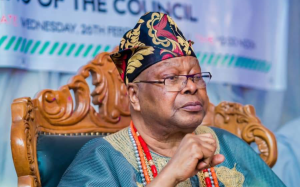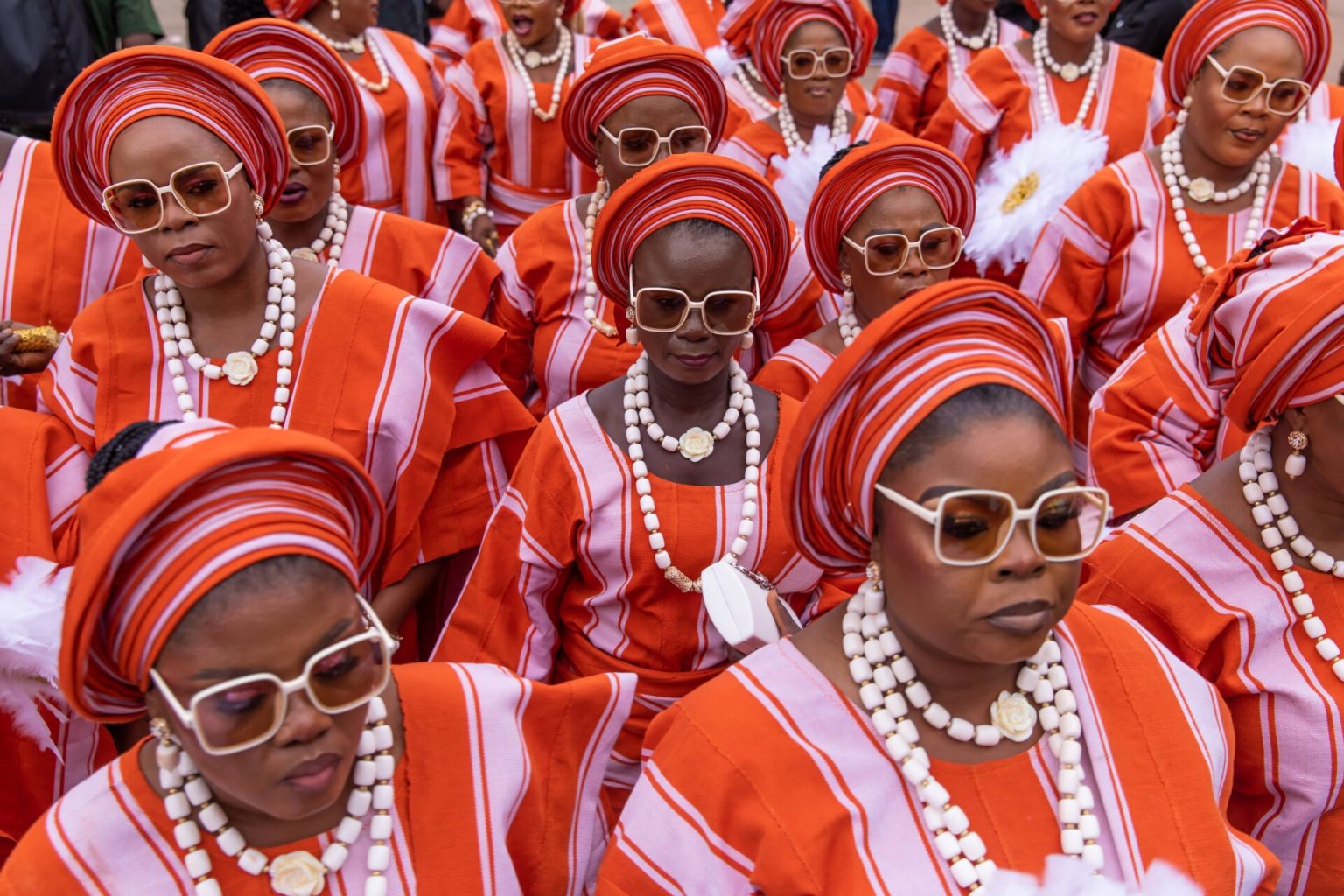Despite the rising cost of living around the world, many Nigerians — especially Ijebu indigenes — from Europe, America, and other parts of Africa attended this year’s Ojude Oba festival, held at the Awujale Pavilion in Ijebu Ode.
They arrived dressed in bright lace, colourful aso-oke, and stylish designer shoes, gathering to pay tribute to their king. For many in the Nigerian diaspora, Ojude Oba is more than a festival — it is a living, breathing link to home, a cherished reunion with friends and family, and a joyful declaration that no matter where life has taken them, this one weekend in Ijebu Ode belongs to tradition. It is an identity many proudly embrace.
“I wait all year for this,” says Dr. Demaji Adeoja, a 50-year-old secondary school teacher based in Manchester. “I’ve attended seven years in a row. Even though things are expensive, I have spent no less than £3,000 for this year’s event — but the money is worth it. There’s nothing like that feeling when you hear the drums, smell the festival food, and see thousands of us gathering under the sun. You remember who you are.”
“I grew up in Ijebu Ode and now live in London,” says Mr. Sola Banjo, a chartered accountant. “Every year, I return for Ojude Oba — this time with my children. It’s their first experience of the festival, and it has helped them connect with our culture. They now understand the significance of wearing the agbada, and they are proud of their Nigerian roots — despite being born British citizens.”
For many diaspora Nigerians — particularly those of Ijebu heritage — Ojude Oba offers an unparalleled sense of cultural rootedness.

The History of Ojude Oba
The origins of the Ojude Oba Festival date back to the late 19th century, when Ijebu Muslims first began visiting the Awujale — the king of the Ijebu people — to offer prayers and show loyalty during Eid al-Adha. What began as a modest royal court visit has since evolved into one of Nigeria’s most colourful and enduring cultural celebrations.
“Our ancestors began this tradition as an act of unity and respect,” says Chief Adekunle Odubote, a senior festival organiser. “Today, it stands as a powerful symbol of Ijebu resilience and our shared cultural identity.”
Across decades of political change, economic transformation, and global crises — including military rule and the COVID-19 pandemic — the festival has remained a cultural constant. Its survival is a testament to the enduring spirit of the Ijebu people.
Corporate partnerships have also helped shape the modern festival. Globacom, for example, has supported the event for over two decades. “Our relationship with Ojude Oba is more than sponsorship,” a Globacom spokesperson says. “It is a cultural covenant — a vibrant alliance between innovation and tradition.”
As the festival continues to grow, organisers hope it will deliver lasting economic impact. “Ojude Oba is here to stay,” says Chief Odubote. “We see it as a legacy event that can transform the economy of Ijebu Ode and, ultimately, all of Ogun State.
Read Also:
Ojude Oba: Abiodun pledges to preserve Ijebu culture, build inclusivity
What you need know about Ojude Oba festival as millions attend
100 million people expected at 2025 Ojude Oba festival
Diaspora Pride and Power
The diaspora’s role in elevating the festival’s profile cannot be overstated. Social media is flooded each year with images of Nigerians from London, Toronto, Atlanta, and Johannesburg, draped in exquisite Yoruba attire — often captioned #OjudeOba.
“The diaspora community amplifies the festival,” says Bimbo Olayemi, a social media blogger from Birmingham. “Through their posts, videos, and networks, they globalise Yoruba identity. They remind younger Nigerians abroad that our culture is not static — it evolves and thrives.”
In London, the impact is visible both online and offline. “We’ve also seen how people are now gathering in Peckham, London, to celebrate Ojude Oba,” Olayemi adds. “Many Nigerians living abroad are proud of their heritage — and they are bringing the spirit of the festival to new audiences.”
For younger diaspora members, Ojude Oba serves as an anchor. “We grew up with stories about it,” says Adeola Adedayo, a 21-year-old student who travelled from New York to attend this year’s event. “Seeing it in person, participating — it’s life-changing. You stop feeling like an outsider to your own culture.”
Many age-grade groups and clubs also turn out in full style for the celebration. Each group joins the grand parade in coordinated outfits, performing traditional dances and chants, all vying for the Awujale’s admiration.
“When our group walks onto the field, the energy is electric,” says Mrs. Kemi Adegbite, 49, an Ijebu-born British Nigerian entrepreneur. “You see friends you haven’t met in 20 years. You greet the king. You remember your ancestors.”
The festival culminates in a grand parade before the Awujale, who watches from an elevated throne, flanked by chiefs and dignitaries.
“Our diaspora are a treasure,” one Ijebu indigene identified as Sowunmi tells New Daily Prime. “They bring not only resources but also renewed pride in our culture. They help us project Yoruba identity to the world.”
This royal welcome adds to the festival’s deep emotional significance.
“It means everything to walk before the king,” says Mrs. Adegbite. “You feel connected to centuries of history.”
Economics of a Cultural Homecoming
Ojude Oba is not just a cultural spectacle — it is a major economic boon for Ijebu Ode and the surrounding communities.
According to local estimates, diaspora attendees inject millions of naira into the local economy each year. Hotels are fully booked months in advance. Tailors work overtime for weeks leading up to the festival. Street vendors enjoy some of their best sales of the year.
“I do most of my annual business during Ojude Oba,” says Alhaja Sidikatu Ogunbanjo, 63, a food vendor who has worked the festival for four decades. “The diaspora spend well — they want to support local people.” The ripple effect extends across multiple sectors of the local economy:
- The demand for traditional attire — such as Aso-Oke and Ori Ade caps — surges in the weeks before the festival.
- Food vendors and caterers experience significantly increased patronage.
- Artisans and performers find an important platform to showcase and monetise their crafts.
Challenges and Cautions
Travelling to Nigeria is not without its challenges. Some diaspora attendees cite concerns about security, flight costs, and logistics.
“Sometimes the roads are tough, and accommodation can be tricky,” admits Mrs. Ayinde. “But it’s worth it. You feel alive there in a way no London Nigerian party can match.”
Others remain more cautious.
“I love Ojude Oba, but this year I stayed away because of security concerns, poor road conditions, and the overall stress of the journey,” says Mr. Ayo Adebayo, a diaspora Nigerian based in New York. “We need better infrastructure to make it easier for those abroad to return. When I came back last year, I spent more than a week in hospital treating an infection.”
Despite these challenges, this year’s festival has been a source of inspiration for many in the diaspora — and is encouraging even more to plan their return for next year’s event.



